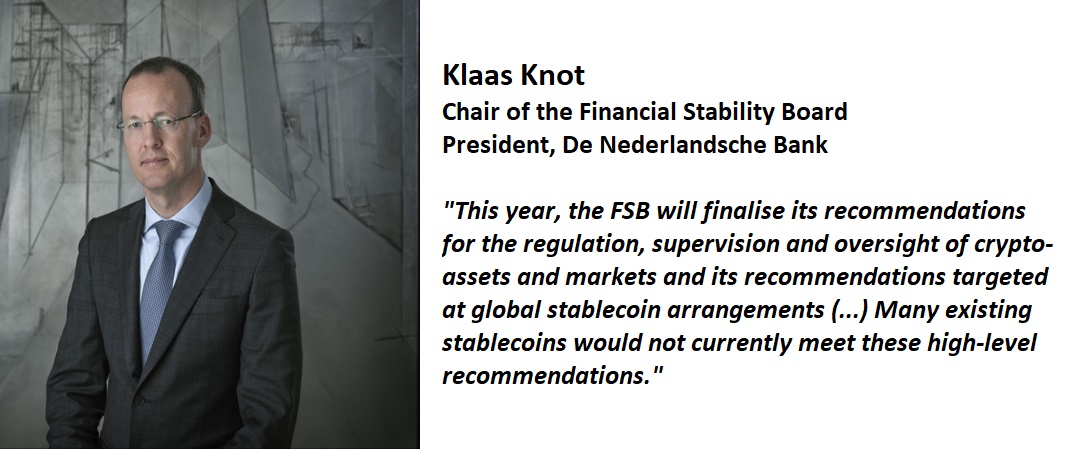
The Financial Stability Board has warned that many existing stablecoins would fail to pass muster under new risk management rules currently being formulated.
Crypto-assets and decentralised finance
The events of the past year, such as the collapse of FTX, have highlighted the intrinsic volatility
and structural vulnerabilities of crypto-assets.
„We have now seen first-hand that the failure of a key intermediary in the crypto-asset ecosystem can quickly transmit risks to other parts of that ecosystem. And, if linkages to traditional finance grow, risks from crypto-asset markets could spill over onto the broader financial system.” wrote FSB chair Klaas Knot in a letter to G20 finance ministers.
The G20 has charged the FSB with coordinating the delivery of an effective and comprehensive regulatory framework for cryptoassets, for which we and the sectoral standard setters have jointly put forth an ambitious 2023 work programme.
Knot explains: „This year, the FSB will finalise its recommendations for the regulation, supervision and oversight of crypto-assets and markets and its recommendations targeted at global stablecoin arrangements, which have characteristics that may make threats to financial stability more acute. The recommendations for global stablecoin arrangements include guidance to strengthen governance frameworks, clarify and strengthen the redemption rights and the need to maintain effective stabilisation mechanisms, among other revisions.
Importantly, the FSB’s work concludes that many existing stablecoins would not currently meet these high-level recommendations, nor would they meet the international standards and supplementary, more detailed BIS Committee on Payments and Market Infrastructures-International Organization of Securities Commissions guidance.
Collectively, these recommendations seek to promote the comprehensiveness and international consistency of regulatory and supervisory approaches, recognizing that many crypto-asset activities and markets are currently not compliant with applicable regulations or are unregulated. We are working with our members, including the sectoral standard-setting bodies, to complete this critical work.”
He continues:
„Additionally, we will deliver a joint paper with the IMF later this year that synthesises the policy findings from IMF work on macroeconomic and monetary issues and FSB work on supervisory and regulatory issues associated with cryptoassets. We will also explore how to address the cross-border risks specific to EMDEs.
Publication of the FSB’s recommendations will only be the beginning of the next phase of work in this area, as the standard-setting bodies will need to make their own, more detailed, recommendations, and member jurisdictions will need to implement the recommendations.
The FSB will continue to coordinate that work, as necessary, and going forward will monitor implementation of the recommendations together with the standard-setters. Once the work is completed, the appropriate regulation of crypto-assets, based on the principle of ‘same activity, same risk, same regulation’ will provide the beginning of a strong basis for harnessing potential benefits associated with this form of financial innovation while containing its risks.
Within the crypto-asset ecosystem, so-called decentralised finance (DeFi) has emerged as a fast-growing segment, and we are delivering to this meeting a report on DeFi. Our report points to the need for proactive monitoring, filling data gaps, and exploring to what extent the cryptoasset recommendations may need to be enhanced to cover DeFi risks. We will build on this work to examine whether additional policy recommendations are needed to deal with this growing segment.
The FSB continues to conduct forward-looking analysis to assess the implications of cryptoassets for financial stability. This year we are undertaking in-depth analysis of the large cryptoasset intermediaries that provide a wide range of services to the ecosystem. We will also undertake analysis of the increasing trend toward the tokenisation of assets and how that could affect financial stability.
The letter in full here
Banking 4.0 – „how was the experience for you”
„To be honest I think that Sinaia, your conference, is much better then Davos.”
Many more interesting quotes in the video below: